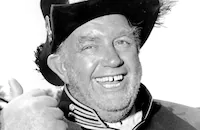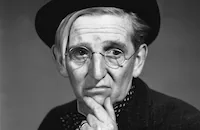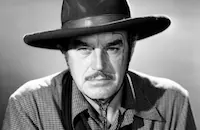Ali Baba and the Forty Thieves
Brief Synopsis
Cast & Crew
Arthur Lubin
Maria Montez
Jon Hall
Turhan Bey
Andy Devine
Kurt Katch
Film Details
Technical Specs

Synopsis
Upon his successful invasion of Baghdad, Hulagu Khan, the Mongol ruler, orders that one hundred of the city's citizens be tortured to death until the Caliph, the deposed ruler of the city, is turned over to him. Outside the city, the Caliph attempts to organize his troops and retake Baghdad while his young son Ali hides in the home of Prince Cassim. Cassim, however, is a traitor to his people, and the Caliph falls into a Mongol trap and is killed. Ali manages to escape, however, and as he wanders the barren lands outside the city, he discovers a secret cave which is home to a band of thieves. Upon the thieves' return, the brave Ali is accepted into their ranks and adopted by Old Baba, their leader. Ten years later, the thieves are the only remaining resistance in Baghdad to the rule of Hulagu, who offers 10,000 pieces of gold for the capture of their young leader, Ali Baba, and the destruction of his men. Learning about a Mongol caravan carrying the fiancée of Hulagu, Ali and his protector Abdullah ride to investigate the matter, and Ali is captured as he talks to Amara, Cassim's daughter and Hulagu's intended. Upon her arrival in Baghdad, Amara tries to break her engagement to the Mongol leader, but the ambitious Cassim forbids it. Later, as he is being prepared for torture, Ali recognizes Cassim, and the young man vows to avenge his father's death. Upon the urgings of Jamiel, her slave, Amara attempts to tell Ali that she is not responsible for his imprisonment, only to be taken prisoner herself when the thieves rescue Ali. Old Baba is mortally wounded in the rescue, and his dying wish is that his adopted son reclaim his rightful place as the ruler of Baghdad. Unaware of Amara's heritage, Ali arranges to trade her for Cassim, but upon their arrival at the traitor's estate, Ali realizes that she is his old childhood friend. Meanwhile, Hulagu receives Ali's offer and tells Cassim that the choice is his. When the cowardly traitor does not appear at his home the next morning, the thieves call for Amara's death to avenge that of Old Baba, but Ali refuses and orders her safe return to Baghdad. When Amara arrives at Hulagu's palace, Cassim confesses that Ali is the Caliph's son, after which Amara proclaims her love for the bandit leader. Amara is then tricked into agreeing to marry Hulagu when Cassim pretends he is being tortured. The wedding, however, is merely another Mongol trap for Ali and his men. Despite Cassim's preparations, Ali and his men manage to overwhelm the Mongol troops and gain entrance into the city. Failing to uncover the thieves, Cassim is executed by Hulagu. Soon thereafter, the thieves attack, and with the help of the people of Baghdad, the Mongols are defeated. Ali then takes his rightful place as the new Caliph, with Amara at his side.

Director
Arthur Lubin
Cast

Maria Montez
Jon Hall

Turhan Bey

Andy Devine
Kurt Katch

Frank Puglia

Fortunio Bonanova

Moroni Olsen

Ramsay Ames
Chris-pin Martin

Scotty Beckett

Yvette Duguay
Noel Cravat

Jimmy Conlin

Harry Cording
Ethan Laidlaw
Hans Herbert
Dick Dickinson
Joey Ray
John Calvert
David Heywood
Pedro Regas
Eric Braunsteiner
Jerome Andrews
Alex Goudovitch
Ed Brown
George Martin
Dick D'arcy
Rex Evans
Belle Mitchell

Harry Woods
Dick Alexander
Art Miles
Alphonse Berge
Charles Wagenheim
Willie Davis
Norman Willis
Pierce Lyden
Don Mcgill
Robert Barron
James Khan
Theodore Patay
Angelo Rossitto
Crew
J. Keirn Brennan
Bernard B. Brown
Fred Cavens
William Fritzsche
John P. Fulton
R. A. Gausman
John B. Goodman
Charles Gould
W. Howard Greene
Jack Gross
Edmund L. Hartmann
Jamiel Hasson
Natalie Kalmus
Stacy Keach
Paul Malvern
Paul Oscard
Jimmy Phillips
Jack Pierce
Robert Pritchard
Richard H. Riedel
George Robinson
Russell Schoengarth
Ray Taylor
Edward Ward
Edward Ward
Ira S. Webb
Vera West

Film Details
Technical Specs

Articles
Ali Baba and the Forty Thieves - Jon Hall & Maria Montez in the 1944 Arabian Nights Adventure - ALI BABA AND THE FORTY THIEVES
The whole of Ali Baba and the Forty Thieves has that kind of feel to it. It's a cheaply-produced Arabian Nights tale that doesn't try too hard to be anything but a simple, colorful adventure. In the days of the Mongol invasion, the son of the Caliph of Bagdad avoids murder and is brought up by a band of forty thieves, who name him Ali Baba. When he is fully grown (played by Jon Hall), he fights to take back Baghdad and restore himself as leader and be reunited with his childhood girlfriend, who has grown up into the stunning Amara (Maria Montez). There are swordfights, romantic moonlit interludes, thundering horses, evil villains, defiant heroes, and almost every color under the rainbow. There's even a secret cave that can only be opened or closed by shouting, "Open, Oh Sesame!" and "Close, Oh Sesame!" (There are also cheap sets and not very convincing back-projection mixed in with actual location shots. Just go with it.)
Arabian Nights (1942) had been the first teaming of Maria Montez and Jon Hall, and it was box office gold. Universal promptly paired the duo five more times, in White Savage (1943), Ali Baba and the Forty Thieves, Cobra Woman (1944), Gypsy Wildcat (1944) and Sudan (1945). As can be deduced from the titles, these films are all of a type -- escapist fantasy, pure and simple. They are also all in Technicolor and feature Montez in dazzling, scanty outfits. It wasn't for nothing that she became known as the Queen of Technicolor. Despite the fact that the Dominican-born Montez couldn't sing, dance or act very well, she came along at the right time, with her exotic, glamorous beauty perfect for the wildly escapist fare that audiences craved during World War II. Films like these are almost never talked about these days, but it is important to remember just how loved they were; it says much about American tastes and popular culture of the time.
Ali Baba is no Cobra Woman or Arabian Nights (yes, these silly-yet-pleasurable films can be ranked), but it sure delivers as a guilty pleasure for 87 minutes. Its alluring color cinematography (by W. Howard Greene and George Robinson) has been sufficiently transferred by Universal onto DVD, though the picture has not received an extensive restoration. The color doesn't exactly pop like the brightest of the restored Technicolor productions, but it still looks quite good. Edward Ward's score is perfectly attuned to the material -- shamelessly, wonderfully, over-the-top.
Universal has released Ali Baba and the Forty Thieves as part of its "Universal Backlot Series." Three other titles now available as single, stand-alone discs are The Trail of the Lonesome Pine (1936), Lonely are the Brave (1962) and Beau Geste (1939). The latter was previously available on DVD and has not been upgraded or restored since, but the others are new to DVD and well worth a look. Lonesome Pine is one of the most important Technicolor films of its time, and Lonely are the Brave is a fascinating, genre-blending western, Kirk Douglas' favorite of all his films.
For more information about Ali Baba and the Forty Thieves, visit Universal Home Entertainment. To order Ali Baba and the Forty Thieves, go to TCM Shopping.
by Jeremy Arnold

Ali Baba and the Forty Thieves - Jon Hall & Maria Montez in the 1944 Arabian Nights Adventure - ALI BABA AND THE FORTY THIEVES
Quotes
Trivia
The movie does not follow the plot of the original series except in the scene where the forty thieves are stuffed in jars and then brought to the palace as a gift for the villain, Kulaba Khan.
Notes
The working title of this film was Raiders of the Desert. The story of Ali Baba and the Forty Thieves is part of the famous Arabian Nights collection, also known as The Thousand and One Nights. According to modern historians, the city of Baghdad reached its zenith under the caliph Harun ar-Rashid, whose reign was the setting for the Arabian Nights fables. The decline of Baghdad began when Hulagu, the grandson of the Mongol conqueror Genghis Khan, took the city in 1258, thus ending the rule of the Abbasid caliphate.
Ali Baba and the Forty Thieves was the fourth of six Universal adventure films to co-star Maria Montez and Jon Hall. It also featured the motion picture debut of actress Ramsey Ames, who had been discovered as a nineteen-year-old singer at The Stork Club in New York City. According to Hollywood Reporter new items, Sabu was originally cast as "Jamiel" in Ali Baba and the Forty Thieves, but after being drafted into military service, he was replaced by Turban Bey. Hollywood Reporter news items include George Dolenz in the cast, but his appearance in the released film has not been confirmed. Some scenes in the film were shot on location in Red Rock Canyon National Park in California and Kanab, UT, according to Hollywood Reporter news items.
Modern sources report that the film was made at a cost of $792,714, including $7,300 for the original screenplay by Edmund L. Hartmann and $18,000 for the services of director Arthur Lubin. Modern sources add the following to the crew credits: Dance Director Lester Horton; Scr clerk Evelyn Bostock; 2d asst dir Judson Cox; 2d unit cine Harry Hallenberger; 2nd Unit Director Fred Frank and Ralph Slosser; and 2d unit scr clerk Joe Kenny. Modern sources include in the cast: Stewart East (Prince of Cawpore); Carl Sepulveda (Palace guard); Margaret Zane, Thelma Haven, Karen Knight and Geraldine Fisette (Handmaidens); Alma Pappas (Princess Kanza Omar); and Betty Lorraine (Paulita Arvizu)
. In 1952, Universal produced a sequel to Ali Baba and the Forty Thieves; entitled Son of Ali Baba, it starred Tony Curtis and Piper Laurie and was directed by Kurt Neumann. In 1965, Universal remade Ali Baba and the Forty Thieves as The Sword of Ali Baba, directed by Virgil W. Vogel, with Frank Puglia reprising his role as "Prince Cassim" and using footage from the 1942 original (see AFI Catalog of Feature Films, 1961-70; F6.4835). Among the numerous films inspired by the tale of Ali Baba are: the 1918 Fox production Ali Baba and the Forty Thieves, directed by S. A. and C. M. Franklin and starring George Stone and Gertrude Messinger (see AFI Catalog of Feature Films, 1911-20; F1.0045); the 1934 British film Chu Chin Chow, directed by Walter Forde and starring Sir George Robey and Fritz Kortner (see AFI Catalog of Feature Films, 1931-40; F3.5305); the 1954 French production Ali Baba et les quarante voleurs, directed by Jacques Becker and starring Fernandel and Samia Gamal; and the 1961 Italian film Le sette fatiche di Ali Baba, directed by Emimmo Salvi and starring Rod Flash and Bella Cortez. For more information on the tales of the Arabian Nights, as well as films either based on or inspired by them, see the entries below for Arabian Nights and Sinbad the Sailor.














